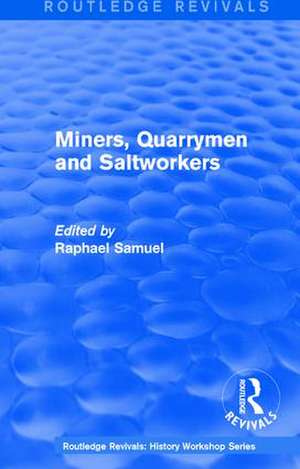Routledge Revivals: Miners, Quarrymen and Saltworkers (1977): Routledge Revivals: History Workshop Series
Editat de Raphael Samuelen Limba Engleză Hardback – 11 aug 2016
| Toate formatele și edițiile | Preț | Express |
|---|---|---|
| Paperback (1) | 356.44 lei 6-8 săpt. | |
| Taylor & Francis – 13 apr 2018 | 356.44 lei 6-8 săpt. | |
| Hardback (1) | 819.90 lei 6-8 săpt. | |
| Taylor & Francis – 11 aug 2016 | 819.90 lei 6-8 săpt. |
Preț: 819.90 lei
Preț vechi: 1102.79 lei
-26% Nou
Puncte Express: 1230
Preț estimativ în valută:
156.88€ • 164.39$ • 129.70£
156.88€ • 164.39$ • 129.70£
Carte tipărită la comandă
Livrare economică 11-25 aprilie
Preluare comenzi: 021 569.72.76
Specificații
ISBN-13: 9781138213586
ISBN-10: 1138213586
Pagini: 381
Ilustrații: 24
Dimensiuni: 138 x 216 mm
Greutate: 0.45 kg
Ediția:1
Editura: Taylor & Francis
Colecția Routledge
Seria Routledge Revivals: History Workshop Series
Locul publicării:Oxford, United Kingdom
ISBN-10: 1138213586
Pagini: 381
Ilustrații: 24
Dimensiuni: 138 x 216 mm
Greutate: 0.45 kg
Ediția:1
Editura: Taylor & Francis
Colecția Routledge
Seria Routledge Revivals: History Workshop Series
Locul publicării:Oxford, United Kingdom
Cuprins
Notes on contributors; General editor’s introduction; Part 1 Mineral Workers Raphael Samuel Part 2 Y chwarelwyr: the slate quarrymen of north Wales Merfyn Jones Part 3 Cheshire saltworkers Brian Didsbury Part 4 The Durham pitman Dave Douglass Part 5 Pit talk in county Durham Dave Douglass; Subject index; Index of places
Descriere
Industrial discipline in mining, quarrying, brickmaking and other classes of mineral work was very different to that in nineteenth-century factories and mills. First published in 1977, this book deals with mineral workers of every class and discusses the peculiarities and common features of their work. It offers three detailed local studies: pit life in County Durham, slate quarrying in North Wales, and saltworkers in Cheshire alongside an introductory section on mineral workers in general. The author is concerned with the family and community setting; the social relationships at the point of production itself; job control and trade unionism; and with material culture, wages and earnings.












